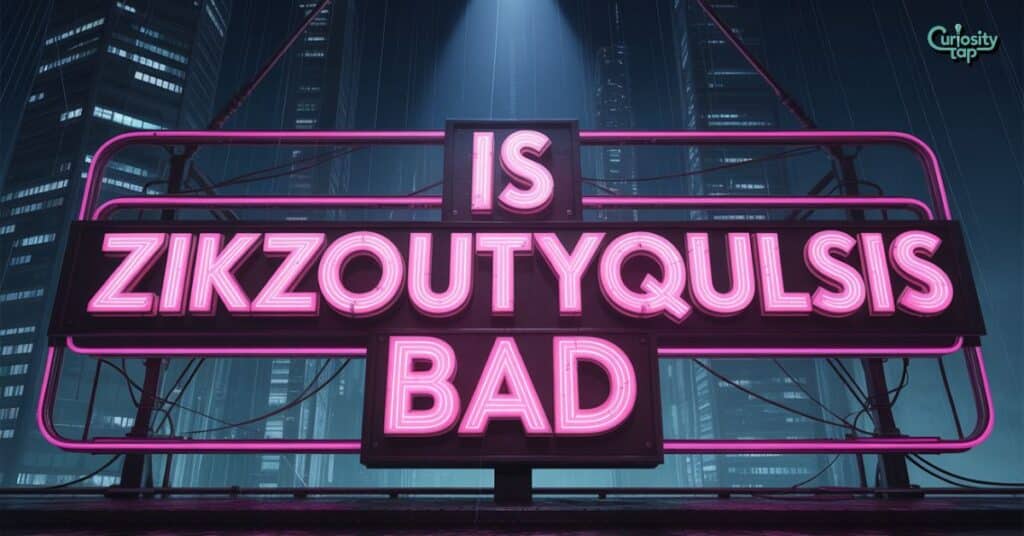The internet never runs out of mysteries. Some fade quickly, others gain traction and evolve into viral phenomena that capture global attention.
One of the strangest cases to spark endless debate is the question: Is Zikzoutyqulsis Bad?
This controversial name appeared suddenly in online spaces and quickly fueled a mix of curiosity, speculation, and outright confusion.
From digital subcultures to mainstream attention, the term has taken on a life of its own.
But what does it actually mean? Where did it come from? And most importantly should you be worried about it?
This guide digs deep into the origins, claims, and facts behind Zikzoutyqulsis.
By the end, you’ll have clarity on whether it’s a viral hoax phenomenon, a niche product label, or something else entirely.
Understanding Zikzoutyqulsis
Before we answer Is Zikzoutyqulsis Bad, we need to define what it actually is.
- Some claim it’s a synthetic compound marketed as an experimental wellness supplement or productivity enhancer.
- Others argue it’s nothing more than a fictional placeholder, a made-up word circulating as part of a digital urban legend.
- Certain underground forums and influencers push it as a trendy yet mysterious concept, feeding the internet hype.
The uncertainty is what makes Zikzoutyqulsis fascinating. To some, it’s a harmless meme.
To others, it’s a shady “supplement” linked to side effects like fatigue, headaches, nausea, and anxiety.
The Origins of Zikzoutyqulsis
The Zikzoutyqulsis origin story is murky. The earliest references appear in Reddit threads and obscure blogs discussing so-called “hidden supplements” that boost energy.
Soon, YouTube reviews and copy-paste warnings spread across comment sections, amplifying the term.
Key factors in its rise:
- Digital subcultures treating it as a coded term.
- Shady sellers promoting it as part of unregulated supplements.
- Content creators using it to farm views, fueling the internet amplification cycle.
Within months, the Zikzoutyqulsis controversy spilled into wider circles, attracting health professionals, consumer watchdogs, and digital culture analysts trying to understand the craze.
Why Some People Think Zikzoutyqulsis Is “Bad”
When people ask Is Zikzoutyqulsis Bad, they usually refer to a handful of claims:
- It’s marketed as a supplement without regulatory approval.
- It may pose health concerns, especially for liver health and neurological functions.
- It could be part of a larger scam vs. legitimacy debate.
- The fear of the unknown a strange name automatically raises suspicion.
The internet thrives on speculation vs. evidence, and Zikzoutyqulsis has become a perfect case study of how misinformation spreads faster than facts.
Fact-Checking the Claims
Let’s put the major claims under the microscope.
| Claim | Reality Check | Verdict |
|---|---|---|
| Zikzoutyqulsis is a dangerous synthetic compound | No verified chemical records exist in peer-reviewed scientific studies | Likely myth |
| It causes side effects like fatigue, headaches, and nausea | Testimonials exist, but no scientific data supports this | Unproven |
| It’s an experimental wellness supplement sold online | Some sellers use the label, often tied to unregulated supplements | Partially true |
| Zikzoutyqulsis is a viral hoax phenomenon | Evidence shows it spread as a digital urban legend first | True |
In short: while shady products may use the name, most claims are rooted in internet hype rather than hard evidence.
Expert and Neutral Perspectives
Several groups have weighed in:
- Researchers in digital culture studies see Zikzoutyqulsis as a social experiment in how ideas spread.
- Health professionals warn against consuming any supplement with no regulatory approval or peer-reviewed studies.
- Digital culture analysts highlight how the Zikzoutyqulsis scam narrative shows the dangers of information overload and weak digital literacy.
Expert consensus: Zikzoutyqulsis is less about real danger and more about the perception vs. reality problem created by the internet.
Real-World Impact and Reactions
Despite its unclear identity, Zikzoutyqulsis has had real effects:
- Online discussions continue across Reddit threads, blogs, and YouTube reviews.
- Consumers report mixed experiences: some say it helped them focus (placebo or not), while others reported side effects.
- Influencers and content creators push the name to gain traffic, regardless of accuracy.
The case shows how consumer trust is easily shaken in an era of unregulated supplements and viral buzzwords.
Debunking Myths Around Zikzoutyqulsis
Here are the most common myths, and the truth behind them:
- Myth 1: Zikzoutyqulsis is a proven brain booster.
- Reality: No peer-reviewed scientific studies confirm this.
- Myth 2: Everyone using it suffers harmful side effects.
- Reality: Reported effects are anecdotal and inconsistent.
- Myth 3: It’s an official medical product.
- Reality: It lacks regulatory approval and is not recognized in medical registries.
- Myth 4: The Zikzoutyqulsis controversy proves it’s a scam.
- Reality: Some sellers may exploit the name, but the term itself began as a viral hoax phenomenon.
Practical Guidance for Readers
If you encounter Zikzoutyqulsis online, here’s how to stay safe:
- Check credibility: Research sources before believing claims.
- Look for scientific evidence: Only trust products backed by peer-reviewed studies.
- Avoid shady sellers: Many use mysterious names like Zikzoutyqulsis to lure buyers.
- Use critical thinking: Ask yourself does this sound like science, or internet hype?
- Remember consumer watchdogs: Check if they’ve flagged the product or term.
A strong digital literacy mindset protects you from falling into traps fueled by misinformation online.
Final Verdict: Is Zikzoutyqulsis Actually Bad?
So, Is Zikzoutyqulsis Bad?
- As a word and viral mystery, no it’s not harmful.
- As a supplement label, yes it could be risky since it’s linked to unregulated supplements and lacks scientific validation.
- As an internet phenomenon, it’s a reminder of how quickly viral phenomena spiral when people abandon critical thinking.
The answer depends on how you encounter it. As a concept, it’s a digital urban legend. As a product, it deserves consumer skepticism.
Conclusion
The rise of Zikzoutyqulsis is less about a real product and more about how the internet amplification machine works.
What started as a viral hoax phenomenon became a trending debate, pulling in blogs, Reddit threads, YouTube reviews, and even health professionals.
Whether you see it as a niche product label or a social experiment, the lesson remains the same:
- Question viral claims.
- Demand transparency in products.
- Strengthen your digital literacy to avoid falling for misinformation.
The mystery of Zikzoutyqulsis isn’t whether it’s good or bad. It’s about how consumer trust issues and information overload create fertile ground for internet hype.
FAQs About Zikzoutyqulsis
What does Zikzoutyqulsis actually mean?
It’s a term used in digital subcultures that later became linked to unregulated supplements.
Why do people say Zikzoutyqulsis is bad?
Because some sellers market it as an experimental wellness supplement with unproven effects.
Is there scientific proof that Zikzoutyqulsis is harmful?
No peer-reviewed scientific studies exist. Most claims come from anecdotal reports.
Should I be worried about Zikzoutyqulsis?
Not as a name or meme. But avoid any supplement with this label due to lack of regulatory approval.
Is Zikzoutyqulsis a scam or legitimate product?
The Zikzoutyqulsis scam narrative is fueled by shady sellers, not by the word itself.
Where did the controversy start?
Mainly on underground forums and Reddit threads, before spreading via influencers and content creators.
How can I fact-check viral claims like this?
Rely on consumer watchdogs, health professionals, and peer-reviewed studies, not rumors.
Read more knowledgeable blogs on Curiosity Tap
Is this article helpful?

Jackson Pearson is a passionate educator and language enthusiast behind the blog Jackson Pearson. With years of experience in teaching and writing, he specializes in simplifying complex grammar rules, breaking down tricky vocabulary, and crafting learning guides that are both engaging and practical. His mission is to help readers boost their English skills whether they’re beginners or brushing up for fluency. Through every article, Jackson brings clarity, structure, and a spark of curiosity to the world of English learning.



